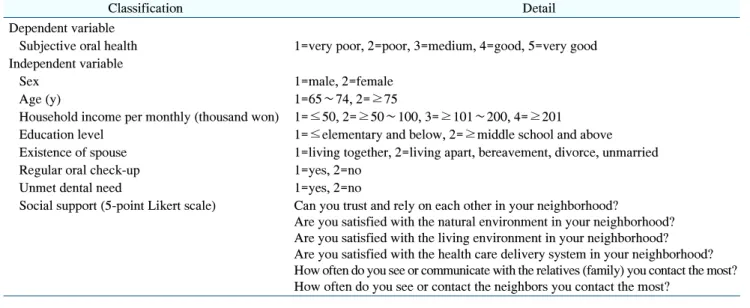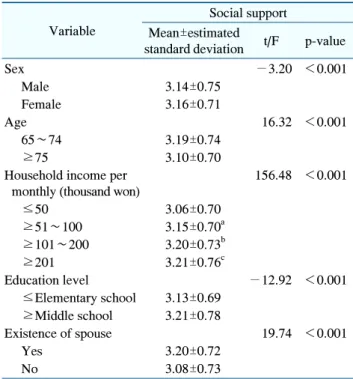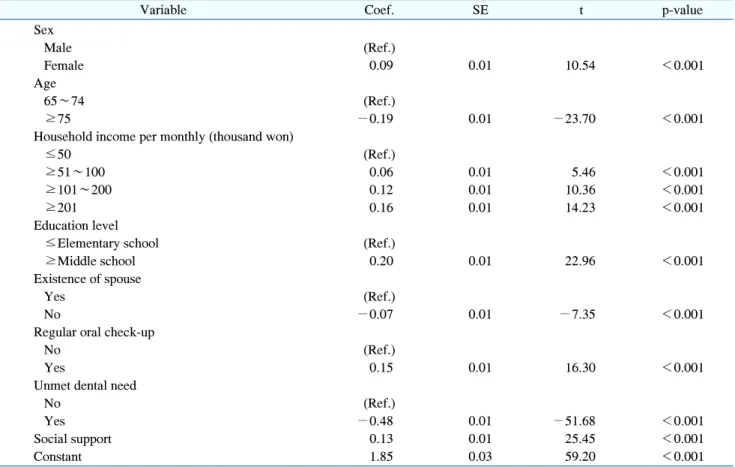RESEARCH ARTICLE
Received: February 27, 2020, Revised: March 24, 2020, Accepted: April 1, 2020 eISSN 2233-7679
†Correspondence to: Sun-Mi Kim, https://orcid.org/0000-0003-0718-9419
Department of Dental Hygiene, Wonkwang Health Science University, 514 Iksan-daero, Iksan 54538, Korea Tel: +82-63-840-1260, Fax: +82-63-840-1269, E-mail: dentalksm@naver.com
Copyright © The Korean Society of Dental Hygiene Science.
Impact of Social Support on Subjective Oral Health Status among Elderly People
Eunsuk Ahn
1, Jin-Ha Lee
2, and Sun-Mi Kim
3,†1
Department of Dental Hygiene, Daejeon Institute of Science and Technology, Daejeon 35408,
2
Department of Dental Hygiene, Kyungbok University, Pocheon 11138,
3
Department of Dental Hygiene, Wonkwang Health Science University, Iksan 54538, Korea
Background: Owing to the increase in the aging population, the health problems of the elderly have become important social
problems. Social support has a positive effect on improving the quality of life and prolonging the life of elderly people. It is one of the major factors that affects the oral health status of elderly people. The purpose of this study was to examine the relationship between oral health status and social support in elderly people using representative data.
Methods: In this study, data from a community health survey in 2015 involving 63,929 elderly people aged over 65 years were
analyzed. T-test and ANOVA analyses were performed to compare the general characteristics of and perception about social support. Additionally, a linear regression analysis was performed to confirm the relationship between perceptions about social support and subjective oral health status.
Results: We found that sex, age, household income, education level, the presence of a spouse, existence of an unmet dental
need, and regular oral check-up had a significant effect on subjective oral health status (p<0.05). In addition, when controlled for all factors, social support has a significant impact on subjective oral health status.
Conclusion:
The findings indicate that social support is associated with the subjective oral health status of Korean elderly. This suggests that community-level or government investment is required to improve the oral health of the elderly. In particular, policy interventions such as the establishment of facilities that promote social networks, especially facilities based on friendship networks, are needed.
Key Words: Aged, Oral health, Social support
Introduction
The health problems of the elderly are indisputably biological and sociological. Health is influenced by the social environment, and health problems result in social problems
1,2). Health problems associated with aging include the decline of physical function and social and psychological deterioration, which is an economic burden.
Integrated health care is very important for elderly people with chronic diseases
3,4). Health care is an important positive variable for social support and self-esteem. It is an important factor for maintaining physical and psychological
health
5-8). Social support refers to a series of actions aimed
at satisfying an individual's physical, material, and
emotional needs through the individuals’ relationships
with those around them
9). Social support, which involves
interaction with others, and self-esteem, which has to do
with valuing one’s self, are components of health care in
terms of personal and social integration, and experiences
through support in the relationship between the
environment and others
2,10). Social support improves the
quality of life and prolongs the life of the elderly and is
seen as one of the major factors that affects the health
status of the elderly
2,9,11).
Table 1. Study Variable
Classification Detail
Dependent variable
Subjective oral health 1=very poor, 2=poor, 3=medium, 4=good, 5=very good Independent variable
Sex 1=male, 2=female
Age (y) 1=65∼74, 2=≥75
Household income per monthly (thousand won) 1=≤50, 2=≥50∼100, 3=≥101∼200, 4=≥201 Education level 1=≤elementary and below, 2=≥middle school and above Existence of spouse 1=living together, 2=living apart, bereavement, divorce, unmarried
Regular oral check-up 1=yes, 2=no
Unmet dental need 1=yes, 2=no
Social support (5-point Likert scale) Can you trust and rely on each other in your neighborhood?
Are you satisfied with the natural environment in your neighborhood?
Are you satisfied with the living environment in your neighborhood?
Are you satisfied with the health care delivery system in your neighborhood?
How often do you see or communicate with the relatives (family) you contact the most?
How often do you see or contact the neighbors you contact the most?
Oral health problems among the elderly are a major health problem. Oral health problems result in weakened teeth and high tooth loss rate. Additionally, the oral condition of elderly people is relatively poor than that of individuals in other age groups
12-14). In particular, elderly people with low socioeconomic status experience social disconnection due to social isolation and alienation and the deterioration of their health and quality of life. Dental problems that require treatment seem to diminish one’s value and importance
15,16). Social support and socioeconomic characteristics are considered fundamental determinants of oral health because they can affect proximal risk factors for oral disease, such as developing oral health-related behaviors and modifying lifestyles
17,18). There is little research on the relationship between oral health and social support in Korea. The purpose of this study was to identify the relationship between oral health and social support in elderly people using representative data. We hope to provide basic data for the development of oral health policies for the elderly who experience social isolation frequently.
Materials and Methods
1. Research subjects
This study used Community Health Survey data from the Korea Centers for Disease Control and Prevention.
The Community Health Survey is a survey to examine the health status and behavior of citizens over 19 years old to provide adequate data for the development of evidence- based health projects in the region. This survey includes items such as health, mental health, oral health, social support, and general characteristics. In this study, data from a Community Health Survey in 2015 involving 63,929 elderly people aged over 65 years were analyzed.
2. Research variables
In this study, the subjective oral health status, measured on a 5-point Likert scale, was used as the dependent variable. The higher the social support score, the more positive the perception of social support. Social support items were measured on a 5-point Likert scale. The score was then averaged and used for analysis. As independent variables, social support variables were calculated using the sex, age, household income, education level, Existence of spouse, oral healthcare behavior (regular oral check-up, existence of an unmet dental need), and social support questions (Table 1).
3. Analysis methods
The general characteristics of the study subjects were
investigated using frequency analysis. The t-test and
one-way ANOVA were performed to compare the
differences in the perceptions of social support according
Table 2. Distribution and Rate of Study Subjects
Variable n (%)
Sex
Male 26,134 (40.88)
Female 37,795 (59.12)
Age (y)
65∼74 36,521 (57.13)
≥75 27,408 (42.87)
Household income per monthly (thousand won)
≤50 15,028 (23.70)
≥51∼100 19,640 (30.97)
≥101∼200 13,449 (21.21)
≥201 15,296 (24.12)
Education level
≤Elementary school 42,156 (66.02)
≥Middle school 21,699 (33.98)
Existence of spouse
Yes 39,710 (62.15)
No 24,179 (37.85)
Regular oral check-up
Yes 12,663 (19.82)
No 51,221 (80.18)
Unmet dental need
Yes 12,449 (19.48)
No 51,465 (80.52)
Table 3. Differences in Social Support and General Characteristics
Variable
Social support Mean±estimated
standard deviation t/F p-value
Sex −3.20 <0.001
Male 3.14±0.75
Female 3.16±0.71
Age 16.32 <0.001
65∼74 3.19±0.74
≥75 3.10±0.70
Household income per monthly (thousand won)
156.48 <0.001
≤50 3.06±0.70
≥51∼100 3.15±0.70
a≥101∼200 3.20±0.73
b≥201 3.21±0.76
cEducation level −12.92 <0.001
≤Elementary school 3.13±0.69 ≥Middle school 3.21±0.78
Existence of spouse 19.74 <0.001
Yes 3.20±0.72
No 3.08±0.73
Data are analysed by t-test and one-way ANOVA statistics.
a-c
The same letter indicates no significant difference by Bonferroni.
to the general characteristics. Bonferroni post-hoc tests were conducted to confirm significant differences between groups. Finally, linear regression analysis was conducted to confirm the relationship between the subjective oral health level, general characteristics, and social support.
For all analysis, STATA software version 11.0 (Stata Corp., College Station, Tx, USA) was used, and the statistical significance level was set at 0.05.
Results
1. General characteristics of research subjects The general characteristics of the study subjects are shown in Table 2. According to sex, 59.12% were females and 40.88% were males. Additionally, 57.13% of the subjects were young elders with ages ranging from 65∼
74 years and the remaining 42.87% were old elders who were 75 years or older. The average monthly household income was 30.97% with more than 51∼100 thousand won being the highest. With regard to education level, only 66.02% of subjects attended elementary school. With
regards to oral care, 80.18% of the subjects did not attend regular oral check-ups, and 19.48% of subjects had an existing unmet dental need.
2. Social support perception according to the general characteristics
The general characteristics and social support perception of subjects are presented in Table 3. The score of the younger elderly was 3.19, which was higher than that of the older elderly (3.10; p<0.05). Additionally, as household income increased, social support increased significantly (p<0.05). Moreover, the presence of a spouse significantly affected the perception of social support (p<0.05).
3. Factors affecting subjective oral health status
The results of the linear regression analysis to confirm
the effect of social support on subjective oral health status
are presented in Table 4. Sex, age, household income,
education level, presence of a spouse, existence of an
unmet dental need, regular oral check-up, and social
Table 4. Factors Influencing Subjective Oral Health


